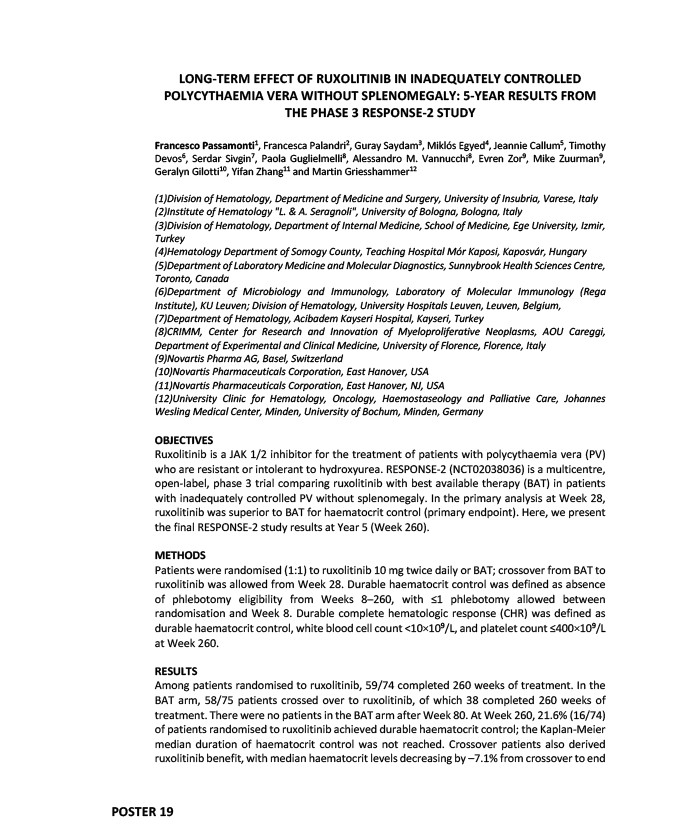
LONG-TERM EFFECT OF RUXOLITINIB IN INADEQUATELY CONTROLLED
POLYCYTHAEMIA VERA WITHOUT SPLENOMEGALY: 5-YEAR RESULTS FROM
POSTER 19
THE PHASE 3 RESPONSE-2 STUDY
Francesco Passamonti1, Francesca Palandri2, Guray Saydam3, Miklós Egyed4, Jeannie Callum5, Timothy
Devos6, Serdar Sivgin7, Paola Guglielmelli8, Alessandro M. Vannucchi8, Evren Zor9, Mike Zuurman9,
Geralyn Gilotti10, Yifan Zhang11 and Martin Griesshammer12
(1)Division of Hematology, Department of Medicine and Surgery, University of Insubria, Varese, Italy
(2)Institute of Hematology "L. & A. Seragnoli", University of Bologna, Bologna, Italy
(3)Division of Hematology, Department of Internal Medicine, School of Medicine, Ege University, Izmir,
Turkey
(4)Hematology Department of Somogy County, Teaching Hospital Mór Kaposi, Kaposvár, Hungary
(5)Department of Laboratory Medicine and Molecular Diagnostics, Sunnybrook Health Sciences Centre,
Toronto, Canada
(6)Department of Microbiology and Immunology, Laboratory of Molecular Immunology (Rega
Institute), KU Leuven; Division of Hematology, University Hospitals Leuven, Leuven, Belgium,
(7)Department of Hematology, Acibadem Kayseri Hospital, Kayseri, Turkey
(8)CRIMM, Center for Research and Innovation of Myeloproliferative Neoplasms, AOU Careggi,
Department of Experimental and Clinical Medicine, University of Florence, Florence, Italy
(9)Novartis Pharma AG, Basel, Switzerland
(10)Novartis Pharmaceuticals Corporation, East Hanover, USA
(11)Novartis Pharmaceuticals Corporation, East Hanover, NJ, USA
(12)University Clinic for Hematology, Oncology, Haemostaseology and Palliative Care, Johannes
Wesling Medical Center, Minden, University of Bochum, Minden, Germany
OBJECTIVES
Ruxolitinib is a JAK 1/2 inhibitor for the treatment of patients with polycythaemia vera (PV)
who are resistant or intolerant to hydroxyurea. RESPONSE-2 (NCT02038036) is a multicentre,
open-label, phase 3 trial comparing ruxolitinib with best available therapy (BAT) in patients
with inadequately controlled PV without splenomegaly. In the primary analysis at Week 28,
ruxolitinib was superior to BAT for haematocrit control (primary endpoint). Here, we present
the final RESPONSE-2 study results at Year 5 (Week 260).
METHODS
Patients were randomised (1:1) to ruxolitinib 10 mg twice daily or BAT; crossover from BAT to
ruxolitinib was allowed from Week 28. Durable haematocrit control was defined as absence
of phlebotomy eligibility from Weeks 8─260, with ≤1 phlebotomy allowed between
randomisation and Week 8. Durable complete hematologic response (CHR) was defined as
durable haematocrit control, white blood cell count <10×109/L, and platelet count ≤400×109/L
at Week 260.
RESULTS
Among patients randomised to ruxolitinib, 59/74 completed 260 weeks of treatment. In the
BAT arm, 58/75 patients crossed over to ruxolitinib, of which 38 completed 260 weeks of
treatment. There were no patients in the BAT arm after Week 80. At Week 260, 21.6% (16/74)
of patients randomised to ruxolitinib achieved durable haematocrit control; the Kaplan-Meier
median duration of haematocrit control was not reached. Crossover patients also derived
ruxolitinib benefit, with median haematocrit levels decreasing by –7.1% from crossover to end